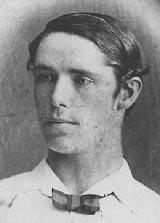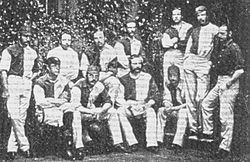Cuthbert Ottaway
Representing his university at five different sports – a record that remains unmatched[2] – Ottaway was also a noted cricketer until his retirement shortly before his early death at the age of 27.
[3] He was educated at Eton (where he was a King's Scholar) and at Brasenose College, Oxford, where he displayed a versatility as a sportsman matched only by his near-contemporary Alfred Lyttelton.
He married, in August 1877, Marion Stinson of Hamilton, Ontario – whom he met, when she was just 13, while touring Canada with an England cricket team[7][8] – and practised law until his death, in London, as a result of complications from a chill caught in the course of a night's dancing.
Ottaway himself received a severe hack on his ankle from Richard Ruck 37 minutes into the final and was forced to leave the field; in his absence, the Old Boys were regarded as fortunate to have held on for a 1–1 draw.
Ottaway failed to recover in time for the replay, held only three days later, and Etonians also lost the services of three other players who had prior commitments.
Although the precise nature of Ottaway's ankle injury remains unknown, there is no evidence that he ever played senior football again after the 1875 Cup Final.
England dominated the match, played before a crowd of around 4,000 at the West of Scotland Cricket Club, but were unable to break down an obdurate Scottish defence, a failing probably attributable to the "rampant individualism" indulged by Ottaway's forwards in this early and formative period of the Association game.
Southwick suggests that he owed his selection solely to Charles Alcock, who had originally been chosen to captain the team by the committee of the Football Association.
"[16] It would appear that the player depended more heavily on skill and control than most footballers of his period; at a time when play of the most robust sort – including body-checking and "hacking" – was in vogue, Ottaway was praised for his grace.
He played as a right-handed batsman and first came to public notice in 1868, when his 108, scored in the Eton-Harrow match at Lord's, was largely responsible for his team's victory in the fixture by an innings and 108 runs.
[19] Though Ottaway represented Gentlemen against Players three times (in 1870, 1872 and 1876) – the highest honour available to a cricketer in the years before the advent of Tests – he is perhaps better known for playing in four Varsity Matches against Cambridge.


